Crypto accounting software emerges as a crucial tool, specifically tailored to meet the unique challenges of cryptocurrency management.
These applications streamline the process of recording transactions and ensuring tax compliance, a commonly murky area for many.
Now, when it comes to this type of software, no one wants just anyone, but the best, but what is the best cryptocurrency accounting software?
The best crypto tax software is crafted to ease the burden of managing a diverse portfolio of digital assets. By automating the laborious tasks of data entry and tax calculations, this software frees users to concentrate more on strategy and less on administrative chores.
In this article, we’ll explore what makes a crypto accounting tool stand out, review the top options available, and address common questions about its usage and capabilities.
Let’s dive in!
What Is a Crypto Accounting Software?

Crypto accounting software is a specialized type of software designed to manage and track cryptocurrency transactions and digital assets effectively.
Unlike traditional accounting systems, it caters specifically to the nuances of digital currency management.
Seamless Integration and Transaction Management
A core function of the best crypto accounting software is to simplify the complex process of recording and reconciling transactions made on different exchanges.
This software supports seamless integration with major crypto exchanges and crypto wallets, allowing users to automatically track their digital asset transactions and manage their crypto accounting from a centralized platform.
These integrations are crucial as they help maintain accurate records of transactions, including purchases, trades, and sales of digital assets.
Automated Tax Compliance and Reporting
Moreover, crypto accounting software plays a vital role in crypto tax compliance.
It automates the generation of essential tax reports and supports the preparation of tax forms needed for tax season.
By handling the calculation of taxes on crypto transactions, including capital gains and other tax implications, this software helps ensure users stay compliant with evolving tax regulations.

Enhancing Financial Processing
Crypto accounting tools also offer functionalities like the ability to import data from various sources, thereby reducing manual entry and minimizing errors.
For accountants and business owners managing cryptocurrency transactions, this software provides a robust accounting system that helps maintain financial data, support tax reporting, and manage client transactions effectively.
Overall, crypto accounting software not only enhances the management of digital assets and crypto investments but also simplifies the financial reporting and tax filing process, making it an indispensable tool for users ranging from individual investors to professional accountants.
What Are the Best Cryptocurrency Accounting Software Providers?
When navigating the complex world of crypto accounting, choosing the right software provider can significantly impact the efficiency and accuracy of managing your crypto taxes.
Here’s a rundown of some of the best crypto accounting services currently leading the market.
CoinTracking
![]()
CoinTracking is a powerhouse for those who need robust analytical tools for tracking and reporting on a diverse array of cryptocurrencies.
This software stands out with its powerful historical data analysis and comprehensive support for over 25,000 cryptocurrencies, making it invaluable for both novice and professional traders.
It automates the import and tracking of transactions via API from various exchanges and wallets, providing users with detailed profit/loss assessments, tax calculations, and portfolio insights, which are essential for strategic decision-making.
Pros
- Leader in detailed transaction analysis and tax reporting.
- Supports an exceptionally wide range of cryptocurrencies.
- Robust historical data for trend analysis and audit reports.
Cons
- The platform’s complexity can be daunting for beginners.
- Limited functionality in the free plan.
- Premium features can be costly.
CoinLedger
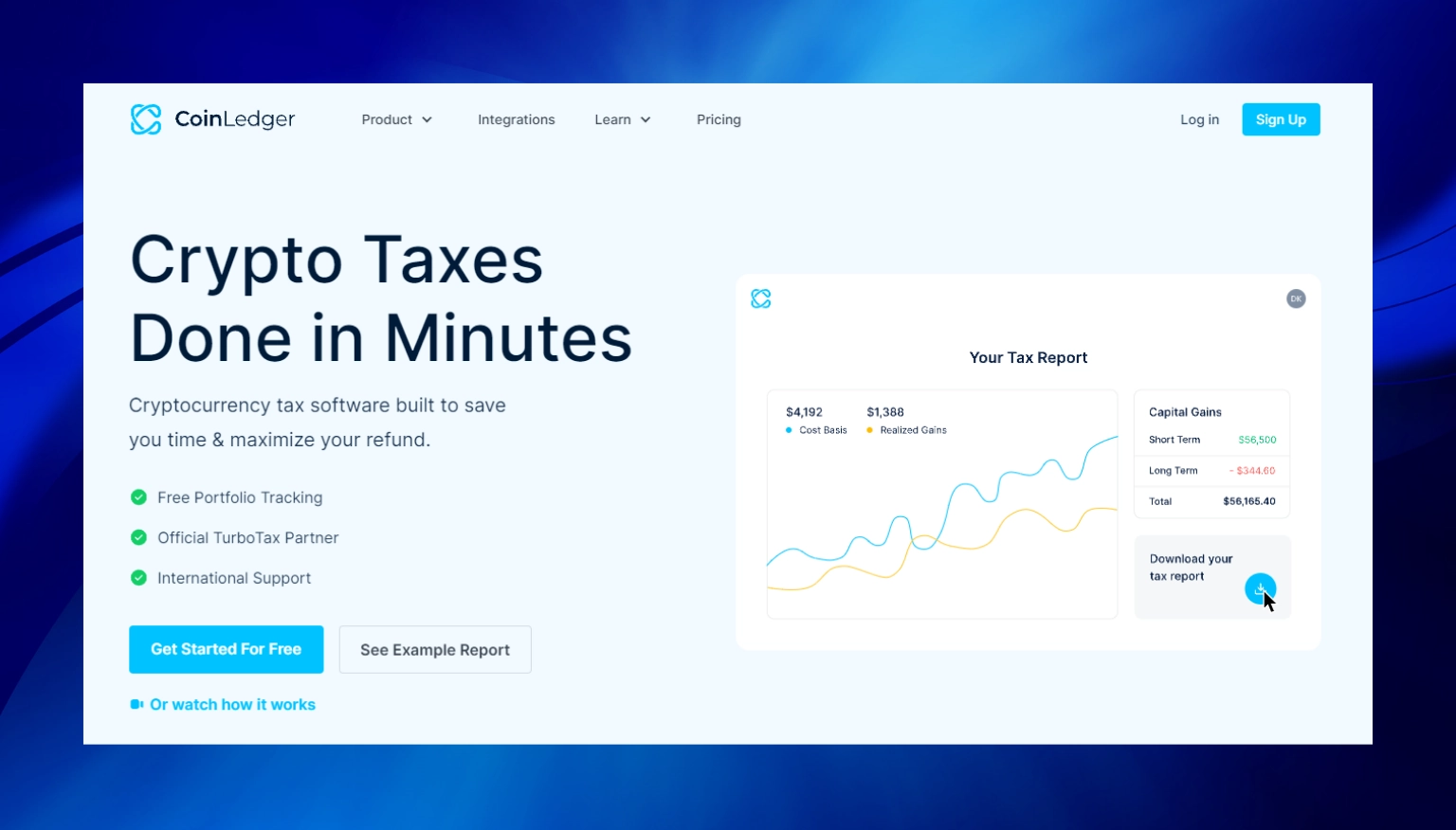
CoinLedger excels in streamlining the tax filing process by integrating seamlessly with over 100 crypto platforms and major tax software like TurboTax and TaxAct.
This connectivity makes it a prime choice for users who manage diverse portfolios and prefer a centralized approach to tax reporting.
Its user-friendly interface simplifies the complicated tax calculation process, making it accessible to both novice and experienced users.
Pros
- Extensive integration with crypto exchanges and wallets.
- Simplifies tax calculations with a three-step process.
- Robust support for various transaction types including NFTs.
Cons
- Limited transactions in lower-tier plans.
- Fewer wallet supports compared to competitors.
- Higher costs for accessing full features.
Koinly
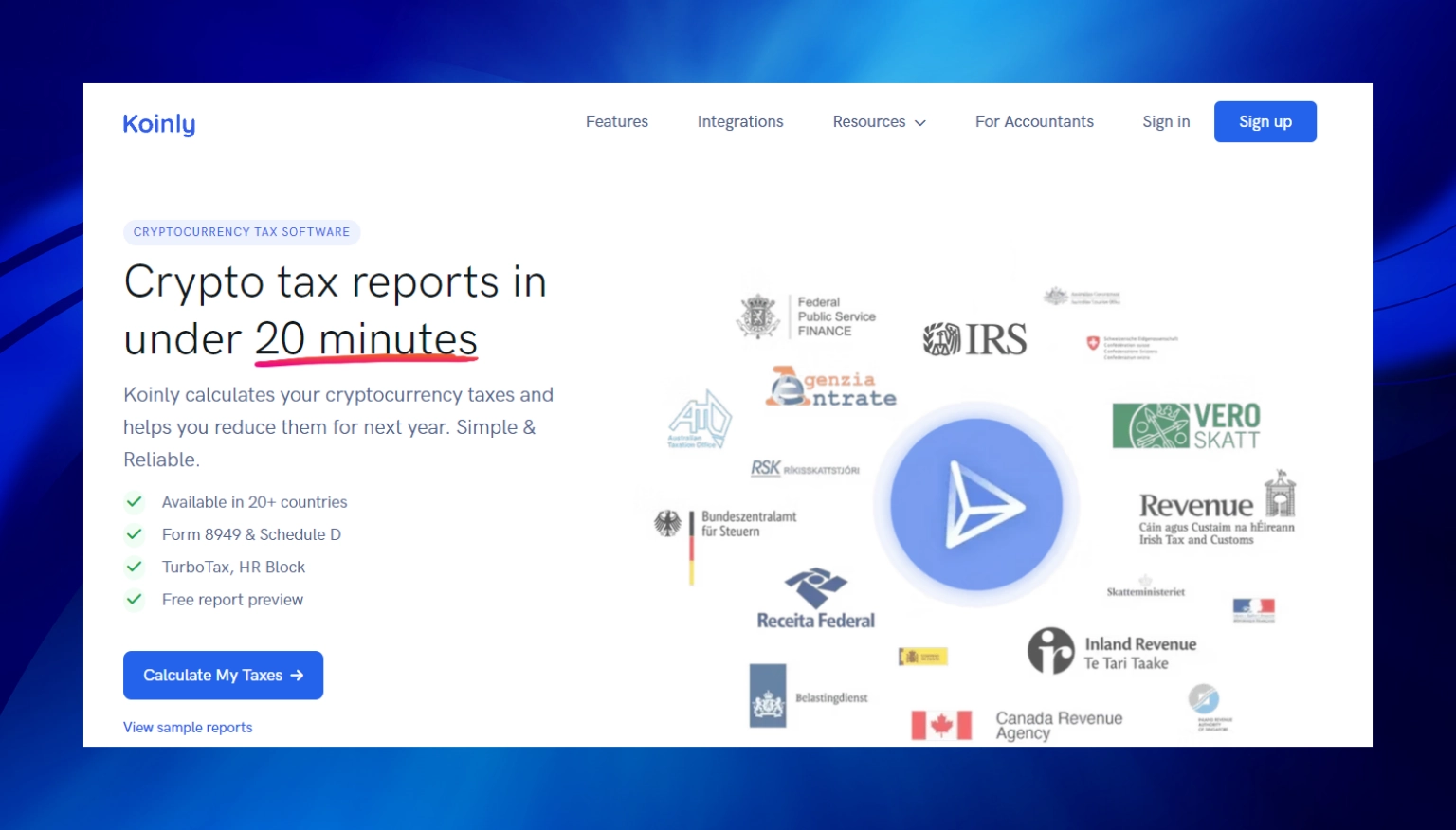
Koinly is known for its powerful flexibility and ease of use, offering detailed tax reporting across over 20 countries.
It supports a massive range of exchanges and wallets, which is ideal for users looking for global compliance.
The platform’s ability to handle up to 10,000 transactions in its free version makes it exceptionally scalable for users experiencing growth in their trading activities.
Pros
- User-friendly with flexible correction capabilities.
- Extensive support for international tax reporting.
- Generous free plan with significant transaction limits.
Cons
- Free plan does not include tax reports.
- Comprehensive features require paid upgrades.
- Priority support is reserved for higher-tier plans.
CoinTracker
![]()
CoinTracker distinguishes itself with robust capabilities to handle over 10,000 cryptocurrencies and advanced features like tax-loss harvesting.
Its deep integration with both crypto exchanges and tax filing services makes it a comprehensive tool for tracking investments and optimizing tax liabilities, especially useful for users with complex portfolios and those engaging in frequent trading.
Pros
- Extensive integrations for seamless data synchronization.
- Advanced features for optimizing tax outcomes.
- Real-time tracking and detailed tax-loss harvesting insights.
Cons
- High cost for users with extensive transactions.
- Limited direct support in basic plans.
- Basic functionality in the free version.
ZenLedger

ZenLedger offers a user-friendly platform that simplifies the crypto tax filing process with features like direct TurboTax integration and support for a wide range of cryptocurrencies.
It’s particularly suited for users who need detailed transaction tracking and those looking for personalized tax advice, thanks to its partnerships with tax professionals.
Pros
- Comprehensive support for various digital assets.
- Seamless integration with popular tax software.
- Access to professional tax consultation.
Cons
- Higher cost for advanced features.
- Complex features may overwhelm beginners.
- Limited features in the starter plan.
Bitcoin.Tax
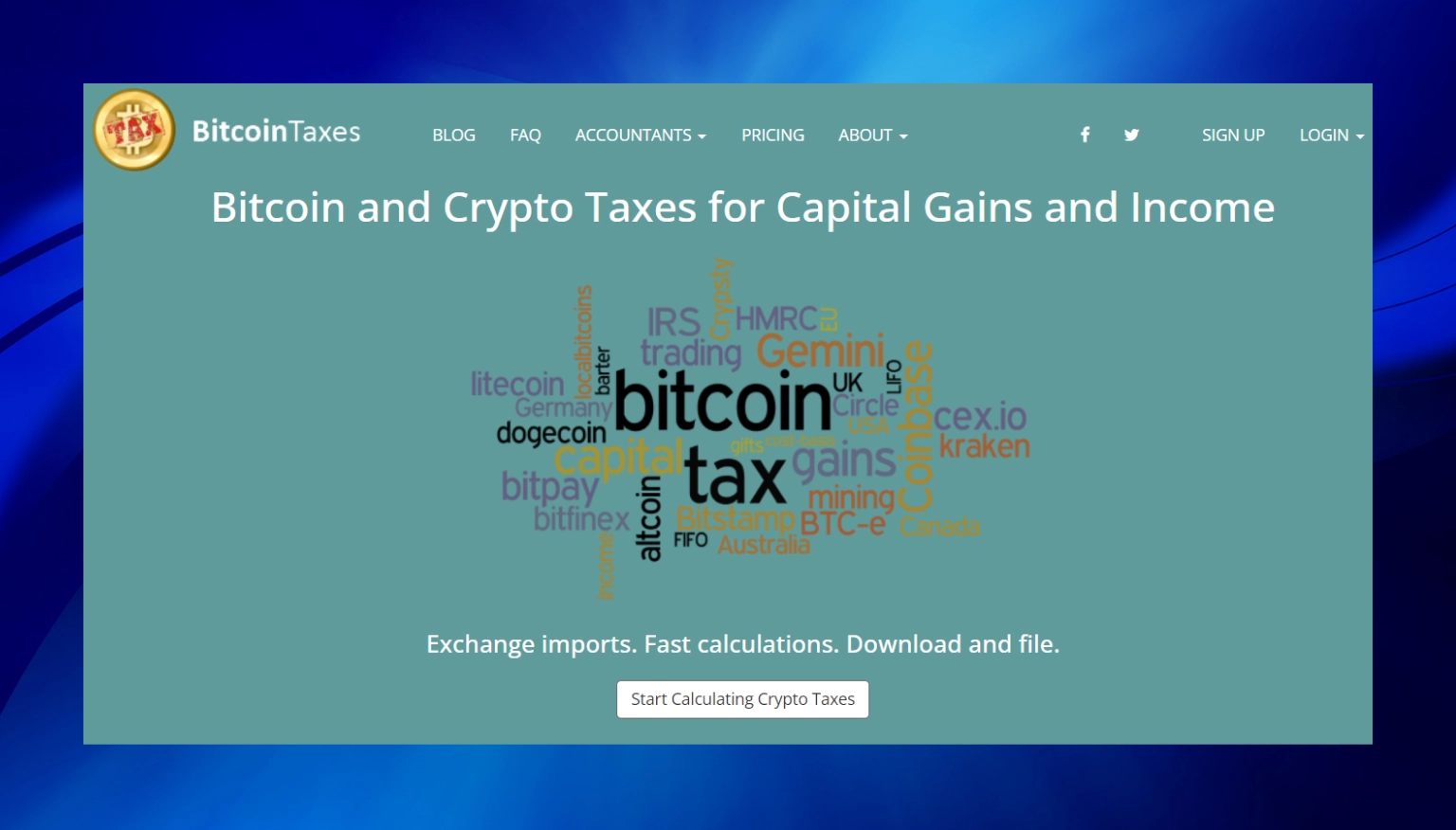
As one of the pioneering platforms in the crypto tax software industry, Bitcoin.Tax offers a reliable and straightforward solution tailored for users who prefer simplicity.
It provides robust functionality for tracking trades and calculating taxes, supporting a wide array of crypto exchanges.
Pros
- Long-standing reputation for reliability.
- Free plan suitable for small-scale traders.
- Comprehensive exchange integration.
Cons
- No live chat support.
- Less feature-rich compared to newer platforms.
- Interface may seem dated to some users.
TokenTax
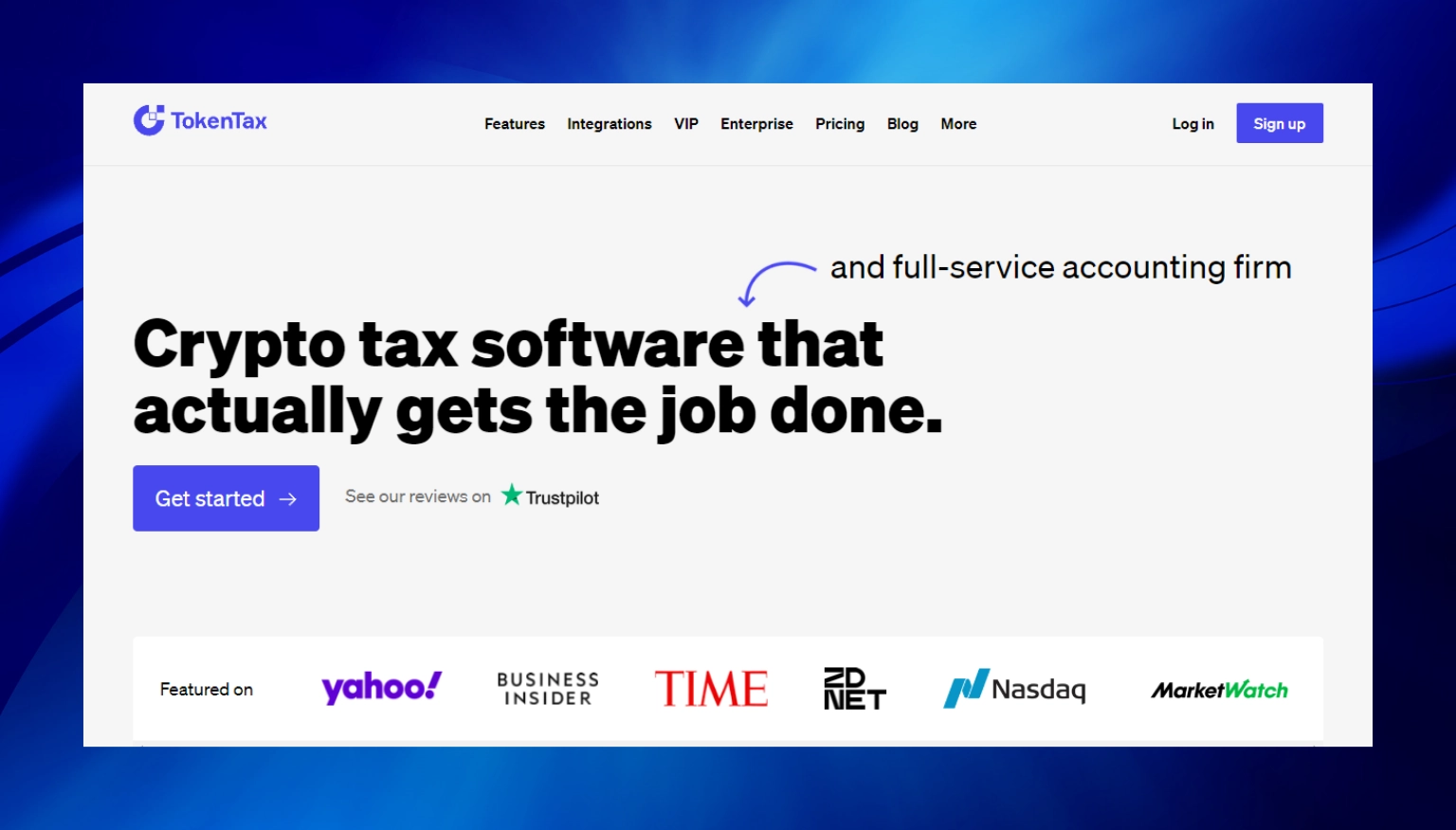
TokenTax stands out for its comprehensive approach, offering services that range from basic tax calculations to full-service accounting.
This makes it ideal for users from casual traders to large enterprises or high-net-worth individuals, particularly those needing detailed attention to DeFi and NFT transactions.
Pros
- Wide range of services from tax software to full accounting.
- Strong focus on DeFi and NFT marketplaces.
- Excellent customer support at all pricing levels.
Cons
- Premium services come at a higher cost.
- May be over-comprehensive for casual users.
- No free version available for trial.
Blockpit
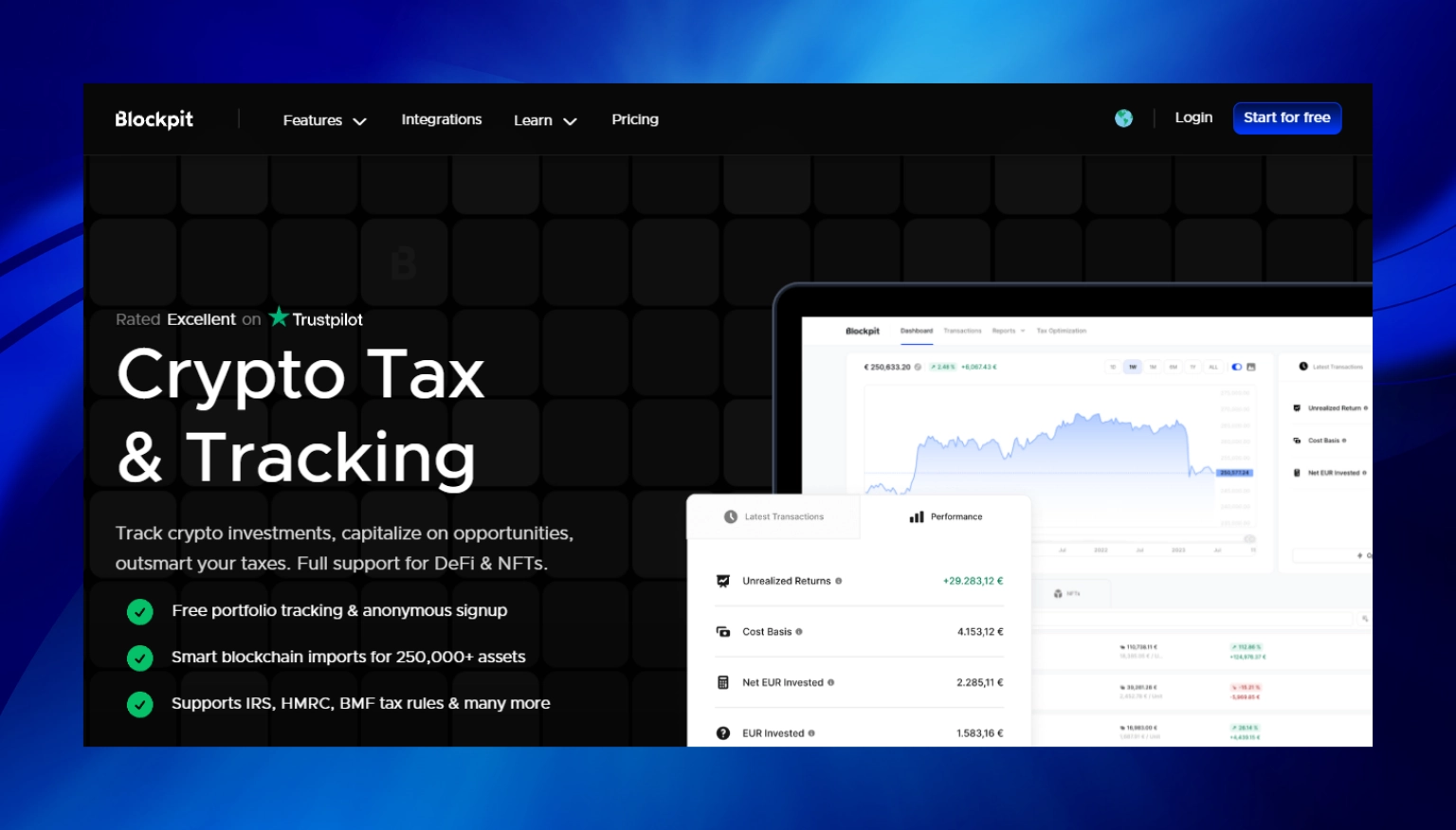
Formerly called Accointing, Blockpit offers a user-friendly interface that appeals to both beginners and experienced users, with tools that simplify the process of tracking, managing, and reporting cryptocurrency taxes.
It supports various tax filing methods like FIFO and LIFO and integrates with major tax software, enhancing its utility for U.S. taxpayers.
Pros
- Intuitive design and easy setup.
- Free version with powerful tools for casual traders.
- Flexible tax reporting options.
Cons
- Advanced features require purchase.
- Primarily focused on the U.S. market, which may limit its applicability for international users.
- Some users may find API integration challenging.
TaxBit
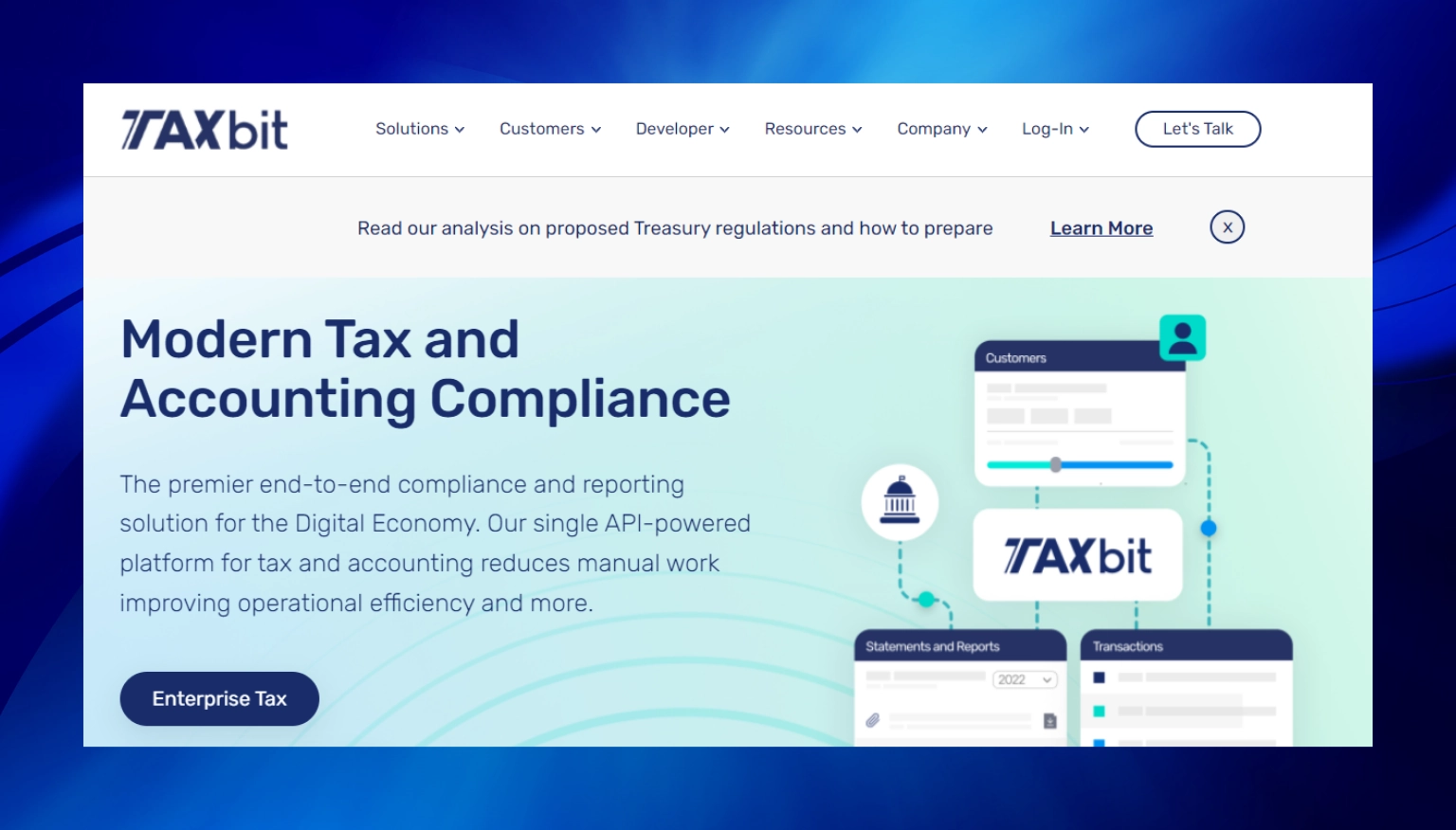
Designed to cater to both individuals and enterprise clients, TaxBit provides a comprehensive suite that includes detailed tax compliance tools and strategies to optimize tax liabilities.
Its strong focus on integration and compliance makes it ideal for businesses looking for robust, scalable crypto tax solutions.
Pros
- Advanced tax optimization strategies.
- Extensive support for integration with exchanges and tax software.
- High focus on security and compliance.
Cons
- Higher price points for professional and enterprise services.
- May be too complex for casual or individual users.
- Lacks a free trial for exploring features before commitment.
CryptoTaxCalculator
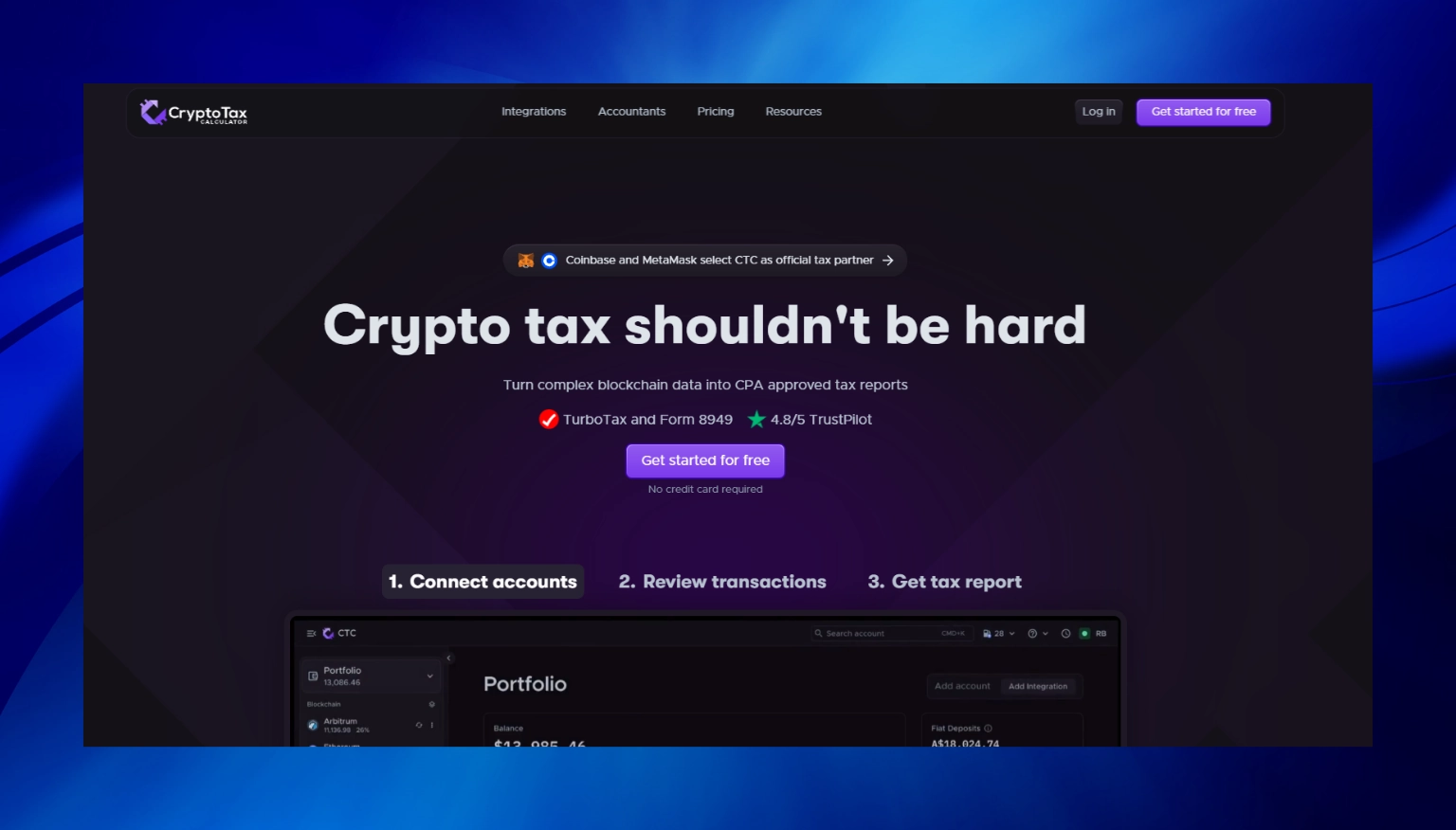
CryptoTaxCalculator is designed to handle the complexities of various types of crypto transactions, from DeFi to NFTs, across multiple blockchains.
This platform excels in providing detailed and accurate tax reports, making it a go-to for users who require meticulous record-keeping and reporting capabilities.
Pros
- Supports a wide array of cryptocurrencies and blockchain activities.
- Detailed reporting aids in tax filing and compliance.
- Offers tools for tax-loss harvesting to optimize tax outcomes.
Cons
- Can be expensive for users with high transaction volumes.
- The depth of features may overwhelm new users.
- Customer support may be limited depending on the plan.
Each of these platforms comes with its unique strengths, focusing on everything from straightforward tax reporting and compliance to in-depth financial analysis and strategy planning.
They also offer tools that range from automatic transaction tracking to generating detailed financial reports and facilitating smooth integrations with other financial software.
When selecting the best crypto accounting software, consider your specific needs related to transaction volume, types of crypto assets managed, and the level of detail required for your financial and tax reporting.
It’s also advisable to check for updates and new features regularly, as the landscape of cryptocurrency taxation and regulation continues to evolve.
Is There an Accounting Standard for Cryptocurrency?

As cryptocurrencies become increasingly integrated into the global financial system, the question of an established accounting standard for these digital assets is more pertinent than ever.
Currently, there is no universally accepted accounting standard specifically for cryptocurrencies, making crypto accounting a challenging area for businesses and accountants alike.
In the absence of specific guidelines from major regulatory bodies, users of crypto accounting software must navigate a complex landscape of existing financial regulations.
Tax regulations surrounding crypto transactions can vary widely by jurisdiction, affecting how businesses report digital asset transactions and manage their crypto tax liabilities.
Crypto accounting software is designed to adapt to these challenges. The software often includes features that support compliance with general financial regulations that can apply to digital assets.

It helps manage crypto taxes, track capital gains, and prepare tax reports, ensuring that users meet tax obligations without manual tracking.
The ability to automatically generate accurate records for tax reporting purposes makes it an invaluable tool for users navigating the uncertain waters of crypto taxation.
The lack of a uniform standard also means that crypto accounting software must be flexible enough to accommodate changes in legislation and tax regulations.
This adaptability is crucial for businesses that operate across different exchanges and jurisdictions, managing cryptocurrency transactions that may be treated differently depending on local laws.
Until a definitive set of crypto-specific accounting guidelines is established, the best crypto tax software remains an essential resource for maintaining compliance and ensuring that every transaction is accurately and efficiently recorded and reported.
How Do We Use Crypto Accounting Software?
![]()
Using crypto accounting software effectively can streamline your crypto asset management and ensure compliance with financial regulations.
Here’s a step-by-step guide on how to utilize this software to optimize your crypto accounting processes:
Step 1: Choosing the Right Software
Start by selecting the best crypto accounting software that fits your specific needs, whether you’re a business owner, individual trader, or accountant.
Look for software that offers comprehensive support for the crypto exchanges you use, robust tax reporting features, and integrations with crypto wallets and other financial tools.
You can choose the one that best suits your needs from the list we have shared above.
Step 2: Setting Up Your Account
Once you’ve chosen your software, the next step is to set it up.
This typically involves creating an account, configuring your security settings, and connecting your crypto wallets and exchanges through secure APIs.
This integration allows the software to automatically track and manage all your cryptocurrency transactions across different platforms.
Step 3: Importing Historical Crypto Data
To get a complete picture of your financial situation, import historical transaction data into the software.
Most crypto accounting software supports bulk crypto data import, which can save time and reduce the likelihood of manual entry errors.
This step is crucial for accurate record-keeping and essential for comprehensive tax and financial reporting.

Step 4: Tracking Transactions
With your accounts and historical data set up, the software can begin tracking new transactions automatically. This includes trades, transfers, purchases, and sales of crypto assets.
The software categorizes these transactions, making it easier to manage them according to tax implications and accounting needs.
Step 5: Generating Reports
Use the software to generate detailed reports on your digital assets and transactions.
These reports can include capital gains calculations, income from crypto transactions, and an overview of your digital asset holdings.
They are invaluable for tax reporting and making informed decisions about your investments.
Step 6: Calculating Taxes
Come tax season, the software can calculate your tax liabilities based on your crypto activities.
This includes determining capital gains or losses and preparing tax forms like the IRS Form 8949 if you’re in the United States.
The ability to calculate taxes accurately saves considerable time and helps avoid potential penalties for non-compliance.
Step 7: Review and Adjust
Regularly review the transactions and reports generated by the software. This helps ensure that all data is accurate and fully reflective of your crypto activities.
Adjustments may be necessary if there are discrepancies or if additional transactions need to be accounted for manually.
By following these steps, you can leverage crypto accounting software to its full potential, making the management of your crypto assets more efficient and compliant with tax laws.
How Are Crypto Transactions Accounted For?

Accounting for crypto transactions requires meticulous attention to detail and precision, given the complexities introduced by the volatile nature of digital currencies.
Crypto accounting software is specially designed to handle these intricacies, providing users with a robust system to track and manage digital assets efficiently.
Here’s how these transactions are accounted for using top-tier crypto tools:
Integration with Wallets and Exchanges
The best software for crypto accounting integrates seamlessly with almost every major crypto exchange and wallet.
This integration enables the software to fetch real-time data on cryptocurrency transactions, ensuring that every transaction is recorded without manual entry.
These connections allow for the accurate tracking of buys, sells, trades, and transfers of crypto assets across other platforms.
Automatic Tracking of Transactions
Once integrated, the software automatically tracks all transactions related to your digital assets.
This includes not only simple trades but also complex movements such as staking, airdrops, and mining rewards.
The software categorizes these transactions appropriately to simplify further reporting and analysis, which is crucial during tax season for calculating taxes and filing accurate reports.
Recording Financial Data
Each transaction is recorded in real-time with details such as date, amount, and asset type. This data is crucial for maintaining accurate and up-to-date financial records.
Crypto accounting software ensures that these records reflect the current market value of the digital assets, which is essential for assessing capital gains and other tax implications.

Generating Tax Reports and Forms
The ability to generate comprehensive tax reports is a key feature of the best crypto tax software. These reports detail the tax implications of various transactions, helping users prepare for tax filings.
The software supports the creation of tax forms, such as those needed for reporting capital gains from crypto assets, ensuring compliance with tax regulations.
Reconciliation and Error Checking
Reconciling the transaction data with bank statements and other financial records is crucial to ensure the integrity of the accounting records.
Crypto accounting software often includes tools that help identify discrepancies and rectify errors automatically, which is invaluable for maintaining accurate records and managing financial data efficiently.
By automating and simplifying the accounting process, crypto accounting software not only helps in managing digital asset transactions but also ensures that all activities are compliant with the current tax laws and accounting standards.
This is indispensable for businesses and individuals who need to keep detailed records of their crypto transactions and prepare for financial audits or tax filings effectively.
Final Thoughts: Choosing the Best Crypto Tax Software for Effective Management

Navigating the intricate world of cryptocurrency transactions and tax obligations can be daunting.
Fortunately, the best crypto accounting software can make this process much smoother by providing tools that help manage digital assets, automate tax calculations, and ensure compliance with current regulations.
These software solutions are indispensable for anyone engaged in cryptocurrency, from casual traders to professional accountants, as they simplify the complexities associated with crypto accounting.
When choosing the right crypto accounting software, it’s crucial to assess how well it integrates with your existing systems, the range of features it offers, and its ability to adapt to the ever-changing landscape of cryptocurrency regulations and tax laws.
Whether your priority is detailed financial reporting, efficient tax preparation, or comprehensive transaction tracking, there’s a software option out there that can meet your needs.
By leveraging the capabilities of the top cryptocurrency accounting software providers, you can save time, reduce errors, and focus more on optimizing your investment strategies.
With the right tools at your disposal, managing your cryptocurrency transactions can become a less stressful and more rewarding part of your financial activities.
Interested in learning more? Don’t miss our best educational articles:
- Developing with Layer 2 Protocols: Enhancing Blockchain Technology
- What is Web3?
- What is Decentralized Physical Infrastructure?
- What are Testnets? Delving into Key Blockchain Dev Environments
- Permissioned vs Permissionless Blockchain: What Are They?
Discover them all by visiting our Learn section!

